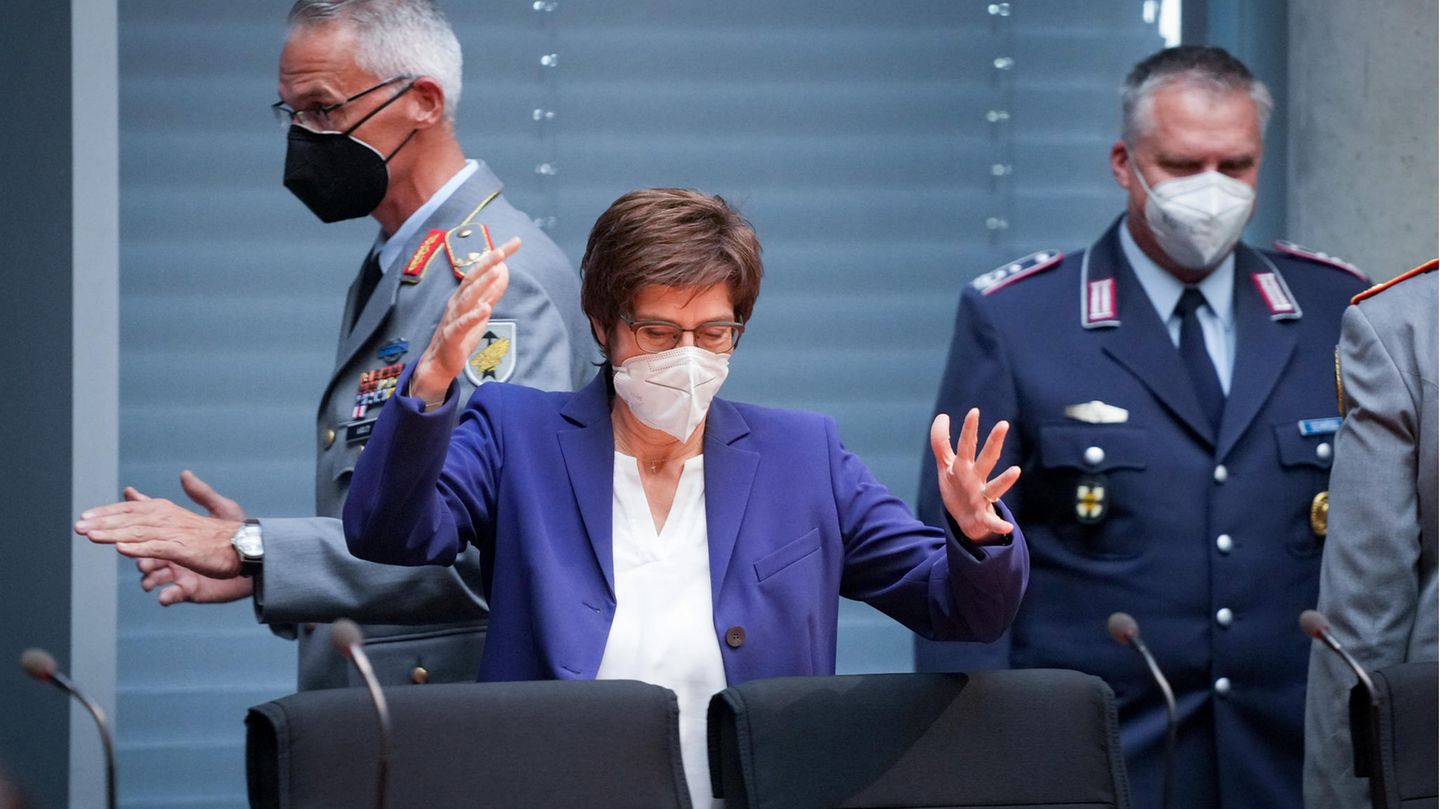How serious are the CDU and SPD when they promise a comprehensive investigation into the Afghanistan disaster? The Greens fear: not too much and called in the Bundestag for a ban on all relevant files and also for ministerial cell phones. Vain.
It was a comparatively unspectacular moment in the last parliamentary debate before the general election. Even before Chancellor Angela Merkel blatantly campaigned for Armin Laschet in the plenary and the three candidates for chancellor delivered their much-acclaimed speech triad, the government majority of the CDU and SPD rejected one of the Greens’ last rules of procedure. The issue of Afghanistan should be discussed again. The Greens were particularly interested in a moratorium on the deletion of all relevant data, files and files for use in the Hindu Kush and the hasty evacuation mission from Kabul.
Regardless of all the public confessions of the CDU and SPD, the Greens have every reason to doubt the seriousness with which the governing parties want to participate in the clarification of the Afghanistan disaster. There were dashing announcements in parliament, for example by the SPD parliamentary group leader Rolf Mützenich or the foreign policy spokesman for the Union, Jürgen Hardt (CDU). But when it came to the acid test two weeks ago and the Green MP Omid Nouripour applied to the Foreign Affairs Committee for a ban on deletion on the subject of Afghanistan, the Union, SPD and AfD stood against each other. The legal basis for how official bodies should deal with files were completely sufficient so that the processes could be clarified in the future, Hardt justified the rejection at the time.
Committee of Inquiry into Afghanistan in the next legislative period
The files and files, including the communication channels on the ministerial cell phones, are presumably the central working principles of a committee of inquiry into Afghanistan that will come in the next legislative period, as Annalena Baerbock, leader of the Greens, announced. In contrast to a commission of inquiry, as it was brought into play by SPD man Mützenich, for example, a committee of inquiry is the parliament’s sharpest weapon in order to examine the actions and also the failures of the government or its ministers. Because – unlike a commission of inquiry – he can also independently summon and question witnesses.
After all, the Greens were able to score a partial success with their procedural rules yesterday. When Federal Defense Minister Annegret Kramp-Karrenbauer (CDU) is asked by Linken Managing Director Jan Korte to confirm whether her ministry has now issued an extinguishing moratorium, she does so with a nod. Which, however, raises the question of why the Foreign Office and the Ministry of the Interior do not proceed in a similar manner?
Two investigative committees recently revealed that crucial data can be lost. In the toll investigation committee, the MPs wanted to take a look at the service cell phones of Transport Minister Andreas Scheuer (CSU) and other employees. Vain. The ministry announced that it was precisely the data from the crucial phase of toll planning that were unfortunately deleted when the phone was switched to a new model. And also in the investigation into the so-called consultant affair in the Ministry of Defense, the MPs came too late. The ministry had deleted all data on Ursula von der Leyen’s (CDU) service cell phone, and the minister herself on a second.
The rules of procedure of the ministries actually stipulate that cell phone data must be archived. However, the ministries can decide for themselves which data are relevant for storage and which are not. Von der Leyen honestly told the investigative committee that she had checked “to the best of her knowledge and belief” and that “nothing had been found”.
The Greens do not want to allow something like that in the Afghanistan disaster. For Nouripour, the past is proof that the legal basis is insufficient to prevent the destruction of data. “When we see how things go haywire, then it is imperative that data is not lost on the side that we will need later as a basis for clarification,” he told the “Süddeutsche Zeitung”. For him, the rejection of the deletion moratorium by the Union and the SPD is “a license to shred”.
A suspicion that the governing parties could not really dispel in parliament yesterday. Jan Korte, managing director of the Left, was not the only one who was surprised: “That is outrageous. Do you have something to cover up?” he asked in the direction of the Foreign Office and the Ministry of the Interior. An accusation that SPD foreign politician Niels Schmidt rejected. It goes without saying that “the federal government and the federal ministries will adhere to the law and statutes”. And Union parliamentary group manager Michael Grosse-Brömer made it clear: “Your general suspicion against ministries, authorities and the Bundeswehr is really out of place.”
Sources: , ,
David William is a talented author who has made a name for himself in the world of writing. He is a professional author who writes on a wide range of topics, from general interest to opinion news. David is currently working as a writer at 24 hours worlds where he brings his unique perspective and in-depth research to his articles, making them both informative and engaging.




